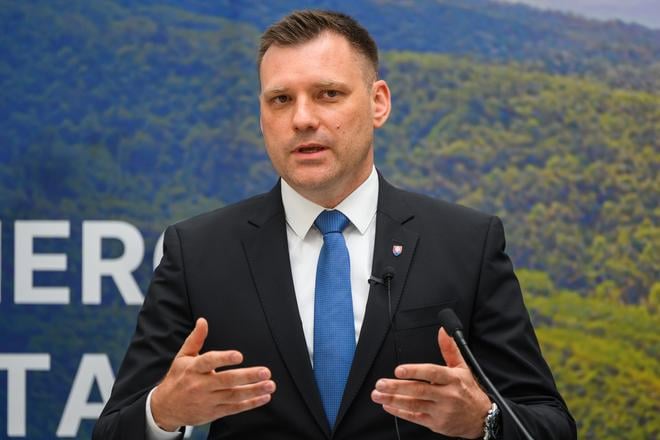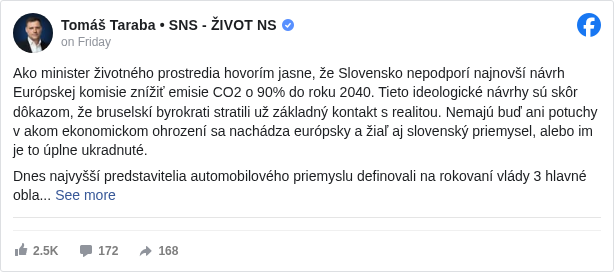The European Commission’s ambitious plan to slash greenhouse gas emissions by 90 percent by 2040 has been met with opposition from Slovakia, whose environment minister dismissed the proposal as ideological and detached from economic reality.
Unveiled in Brussels by EU climate commissioner Wopke Hoekstra and Commission vice-president Teresa Ribera in early July, the non-binding target is intended as a milestone on the path to carbon neutrality by 2050. The Commission argues the target is both achievable and necessary, offering member states more flexibility and a limited scope for international carbon trading from 2036.
“We remain committed to decarbonisation,” Hoekstra said. “We are ambitious. We are pragmatic. We are flexible.”
But in Slovakia, the government’s reaction was swift and scathing. Environment Minister Tomáš Taraba, a nominee of the far-right Slovak National Party (SNS), announced that Slovakia would not support the Commission’s proposal, accusing Brussels of pursuing “ideological” goals without regard for industry.
“These ideological proposals show that Brussels bureaucrats have lost touch with reality,” Taraba wrote on social media. “They either have no idea about the economic threats facing European and Slovak industry, or they simply don’t care.”
The minister claimed the proposal would further damage the competitiveness of European manufacturing, pointing to stricter emissions limits, high energy costs and insufficient waste incineration infrastructure as key concerns raised by automotive industry leaders in recent meetings with the Slovak government.
Green groups slam Taraba’s stance
His remarks drew sharp criticism from environmental groups. The Climate Coalition, a Slovak platform of NGOs, called Taraba’s stance “dangerous” and “out of touch with reality”, accusing him of ignoring both the science and Slovakia’s own mounting climate impacts.
“At a time when we are witnessing the climate crisis in Slovakia through extreme droughts alternating with floods, the minister closes his eyes to this dangerous reality,” said coalition coordinator Lucia Szabová. “If anyone is out of touch, it is him – not those trying to set responsible targets.”
The Climate Coalition said the minister was selectively highlighting only those parts of industry resistant to change.
The platform argued that embracing green transformation is not only necessary but offers economic opportunities, including in heat pump manufacturing and renewable energy. Szabová said Slovakia risks falling further behind by failing to adapt.
“This is not some Brussels whim,” she said. “Climate goals and the green transition already bring results. We are losing competitiveness because of our slow response to change.”
Slovakia has long struggled to keep pace with EU climate targets. The bloc has already committed to cutting emissions by at least 55 percent by 2030 compared to 1990 levels. Yet current national plans suggest the EU as a whole is on track for a 54 percent reduction – just shy of the target.
Bloc divided over 2040 target
The new 2040 goal, while non-binding for now, will shape the next decade of EU policy and funding. The Commission insists the proposed trajectory aligns with recommendations from the European Scientific Advisory Board on Climate Change. However, some member states – including Italy and the Czech Republic – have also expressed doubts about its feasibility.
Environmental analysts warn that rejection by even a few states could delay or dilute collective action. Still, the Commission hopes negotiations with national governments and the European Parliament will result in a shared vision.
Hoekstra defended the plan’s flexibility and stressed that emissions reductions can be achieved through credible mechanisms, including carefully regulated international trading. “From the planet’s perspective, it doesn’t matter where emissions are released or avoided,” he said. “What matters is that the system is verifiable and trustworthy.”
For now, however, the EU’s climate ambitions appear to be colliding with a political backlash in parts of the bloc.



